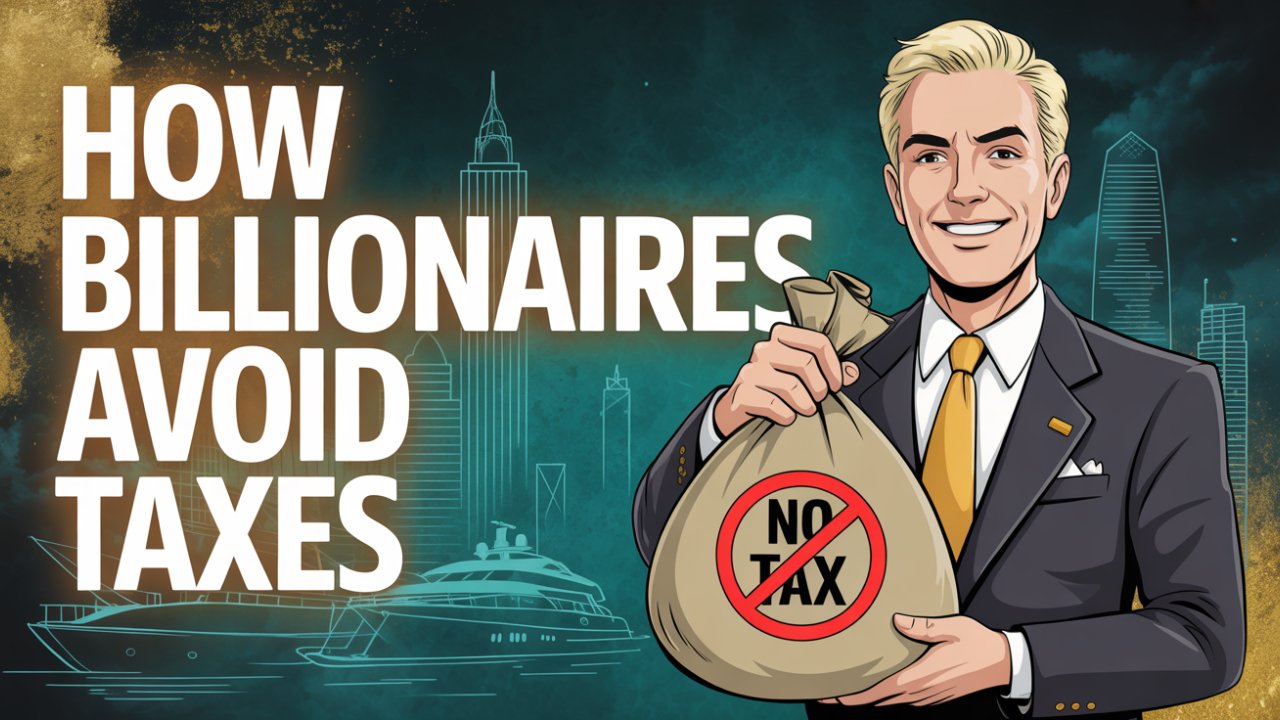So, you probably paid taxes this year. It came straight out of your paycheck, you saw the numbers on your W-2, and maybe you even had to write a check to the IRS in April. It’s a core part of being a citizen.
But what if I told you that in some recent years, a handful of the wealthiest people on Earth names you know, like Jeff Bezos and Elon Musk have, according to investigative reports, paid zero dollars in federal income tax? Nothing.
How on earth is that possible? How can someone whose fortune grows by billions in a single year legally pay less in income tax than you did?
Well, it’s not because they’re all mustache-twirling villains committing massive fraud. It’s because they’re not playing the same financial game as the rest of us. The U.S. tax system is designed to tax one main thing: income. And the super-rich have become masters at engineering their lives to have as little “income” as possible. They follow a playbook of sophisticated, and crucially, legal strategies that let them build incredible fortunes while contributing next to nothing to the system that helps them do it.
Today, we’re breaking down that playbook. Forget what you think you know about taxes. We’re about to see how the other half or rather, the other 0.001% lives.
To get how this all works, you have to grasp the single biggest difference between their financial world and ours: income versus wealth.
For most of us, those two things are basically the same. Your income is your salary, and that salary is how you try to build a little wealth, maybe by saving or putting money in a 401(k). You earn it, it gets taxed right away, and you live on what’s left. The median American household makes around $70,000 a year and pays about 14% of that in federal taxes.
But for a billionaire, a salary is practically irrelevant. Their financial world revolves around wealth. Their fortune isn’t cash sitting in a bank. It’s held in assets things that grow in value. Think huge piles of stocks, ownership in companies, giant real estate portfolios, fine art, you name it.
And this is where they use the first secret. The U.S. tax code is built to tax realized gains. That’s a fancy way of saying you only pay tax on an asset’s growth when you sell it. If you buy a stock for $10 and it explodes to $1,000, you don’t owe a penny in taxes as long as you just hold on to it. That $990 difference is an “unrealized capital gain.” Billionaires can see their wealth skyrocket by billions from these unrealized gains, but since they haven’t sold anything, their taxable income can be shockingly low.
This leads to the first big play in their book: take stock, not a salary.
Many famous billionaire CEOs take a laughably small official salary. Sometimes it’s literally one dollar. Why? Because a salary is ordinary income, and that gets taxed at the highest rates. Instead, they get paid in stock options or restricted stock units (RSUs).
Stock options give an executive the right to buy company stock later at a price that was set in the past. Imagine a CEO gets options to buy a million shares at today’s price of $10. A few years later, the stock is flying high at $500 a share. They can then “exercise” their options, buying a million shares for just $10 each. Boom an instant paper gain of $490 million. And for certain types of options, that massive gain isn’t immediately taxed as income.
RSUs are even simpler: they’re just shares they’re given after they’ve worked at the company for a certain amount of time. When those shares “vest,” their value is taxed as income, which does sound like a big tax bill. But that’s just one part of the puzzle. The real genius isn’t in how they get the wealth, but in how they use it.
The main goal is to never create a “taxable event.” Selling stock is a taxable event. Getting a big salary is a taxable event. The whole game is about growing your wealth like crazy while dodging those events. They pile up assets, watch them grow, and then, instead of selling them for cash, they use the most powerful strategy in their entire playbook.
If you remember one thing from this video, make it this. The core of billionaire tax avoidance is a three-step process that experts call “Buy, Borrow, Die.” This isn’t some conspiracy theory; it’s a well-documented strategy that lets them live off their fortunes, tax-free. Let’s walk through it.
First, you acquire assets that go up in value. This is the “Buy” part. As we just covered, this isn’t about a salary; it’s about owning things that will be worth more tomorrow. The classic targets are stocks and real estate, but it can be anything from art collections to private companies.
They aren’t day trading. Nope. They’re buying and holding for the long run. They get massive blocks of stock or keep their ownership in the companies they founded. They are building a mountain of wealth.
And remember, this mountain is mostly untaxed as long as they don’t sell. A billionaire’s net worth can shoot up $10 billion in a year because their company’s stock soared, but on paper, their taxable income could still be near zero. They just sat on the shares and watched them grow. This mountain of appreciating, untaxed assets is the foundation for everything else.
But you can’t use a stock certificate to buy a superyacht. So how do they turn this paper wealth into cash without sending a huge chunk of it to the IRS? That brings us to the most brilliant part of the plan.
This is the secret sauce. Instead of selling their assets and paying capital gains tax, the ultra-rich just go to a bank and take out huge loans using their stock portfolio as collateral.
Why is this a cheat code? Because the IRS does not consider loans to be income. When you get a loan any loan that cash is not taxable. It’s debt. So a billionaire can pledge a fraction of their multi-billion-dollar portfolio and walk out with hundreds of millions in cash. Completely tax-free.
And the terms they get are incredible. To a bank, a billionaire with a $50 billion portfolio is the safest bet imaginable. They can borrow at rock-bottom interest rates. This is standard operating procedure at the top. Banks like Morgan Stanley have reported that their wealthy clients have taken out over $68 billion in these kinds of loans. Larry Ellison of Oracle reportedly had a $10 billion line of credit; Elon Musk has pledged huge amounts of his Tesla stock for personal loans.
They use this tax-free cash to fund their lifestyles. They buy the mansions, the planes, the private islands. They can even use borrowed money to make new investments, growing their wealth even faster. All without selling a single share, and therefore, without paying a single dollar in capital gains tax.
Let’s make it simple. Imagine a billionaire named Jane. Jane owns $2 billion worth of stock in a company she started. She needs $50 million.
What you or I would do: We’d have to sell $50 million worth of assets. Assuming it’s a long-term capital gain, we’d instantly owe around 20% in federal taxes, plus another 3.8% for the net investment income tax, plus state taxes. That’s a tax bill of $12-15 million, easily. We’d have to sell almost $65 million in assets just to walk away with $50 million cash.
What Jane does: Jane calls her private banker. The bank sees her $2 billion portfolio and happily gives her a $50 million loan at a tiny interest rate, say 2%. She gets $50 million in cash, totally tax-free. Meanwhile, her $2 billion portfolio keeps growing. If it grows by an average of 8% that year, that’s $160 million. The growth of her assets dwarfs the $1 million in interest she owes on her loan. She’s literally getting richer while living off tax-free borrowed money.
This can go on forever. As their assets grow, their borrowing power grows. It’s a perpetual cash machine. But what about the loans? Don’t they have to be paid back? That takes us to the final, and most audacious, step.
It sounds dark, but this is the final, critical piece of the puzzle. When a wealthy person dies with all these unrealized gains and outstanding loans, our tax code does something that can only be described as magic. It’s called the “stepped-up basis.”
Here’s how it works. Under current law, when you inherit an asset, its cost for tax purposes is “stepped up” to whatever it was worth on the day the original owner died. All the capital gains that piled up during that person’s lifetime? Erased. Wiped clean. Gone forever.
Let’s go back to Jane. Say she bought her stock decades ago for just $10 million. When she dies, it’s worth $2 billion. That’s a $1.99 billion unrealized gain. If she’d sold it, she would have owed hundreds of millions in taxes.
But she held on. Now, her kids inherit that $2 billion portfolio. Thanks to the stepped-up basis, their cost basis isn’t the $10 million Jane paid. It’s the full $2 billion. They can sell the entire thing the next day for $2 billion and pay zero dollars in capital gains tax. That nearly $2 billion in growth, which Jane lived on by borrowing against it, is never taxed.
And the loans she took out? Her estate just uses a tiny piece of the inherited assets to pay them off, no tax consequences.
The strategy is complete. Buy assets. Borrow against them to live tax-free. Then die, and have the tax basis reset, wiping a lifetime of gains from the books forever. It’s a perfectly legal cycle that lets fortunes grow and pass down almost entirely outside the tax man’s reach.
Pretty wild when you see it all laid out, right? And these are just the basics. If you’re finding this look behind the curtain of billionaire finance eye-opening, and you want to learn more about how money really works, hit that subscribe button and turn on notifications. We’re just getting started.
While “Buy, Borrow, Die” is the main event, the billionaire’s playbook has a ton of other moves to slash any taxes that might pop up.
Real estate is a favorite for a reason: the tax code is incredibly generous to property owners. Billionaires buy up commercial buildings and luxury homes. They can deduct all the usual stuff like mortgage interest and property taxes. But then they get to use a powerful tool called depreciation.
Depreciation is an accounting trick where the IRS lets you deduct the “wear and tear” on a building over its life. The wild part is that they get to take this deduction even while the property is actually going up in value.
So, a billionaire buys a building for $40 million. The IRS says they can write off a piece of that value every year. That can add up to a tax deduction of over $1 million every single year. This “paper loss” can be used to wipe out other real income. They can end up with a building that’s making them millions in cash but looks like it’s losing money on their tax return.
Charitable giving is a great thing, but for the wealthy, it’s also one of the best tax-avoidance tools there is. The secret is how they give. They don’t give cash. They give stock.
Here’s the double-dip benefit. Let’s say our billionaire Jane wants to give $20 million to a museum. She has $20 million of stock she originally bought for only $1 million.
If she sold the stock to donate the cash, she’d first have to pay capital gains tax on that $19 million gain a bill of almost $5 million.
But instead, she donates the stock directly to the charity. When she does this, she gets a tax deduction for the full $20 million value. And here’s the kicker: nobody ever pays the capital gains tax on that $19 million of growth. It just disappears. It’s a huge win-win for her and the charity.
This is where things get really murky. The ultra-wealthy often use a complex web of partnerships and LLCs. These “pass-through” businesses don’t pay corporate tax; the profits and losses are “passed through” to the owners.
The rules for how all this is allocated are incredibly flexible. That flexibility, as one U.S. Senator has pointed out, creates massive loopholes for wealthy investors. They can use sophisticated accounting moves to shift income and losses around in ways that make their tax bills shrink.
These structures are also a nightmare for the IRS to audit. The number of these partnerships has exploded, but the audit rate for them has fallen to less than half a percent. It’s a black box that can legally shield billions from taxation.
Finally, there’s the classic strategy of using tax havens. While this can cross into illegal territory, it’s often structured to be legally gray, shielding wealth from the country where it was made. By using shell companies and trusts in places with zero tax rates, it becomes incredibly hard for home countries to track and tax that money. And this isn’t just a rich country problem; it’s estimated that corporate tax dodging costs poorer countries at least $100 billion a year.
Each of these plays works together with the main “Buy, Borrow, Die” strategy to make sure that no matter what, the tax bill stays at an absolute minimum.
It’s easy to dismiss this as a game for people on another planet. But this system has massive consequences for all of us, affecting everything from our schools to the stability of our economy.
The most obvious impact is on tax revenue. Every dollar avoided by a billionaire is a dollar that can’t be used to fund schools, roads, science, or healthcare. When the wealthiest people contribute a tiny fraction of their gains, the burden shifts to the rest of us. That leaves only two choices: cut public services or raise taxes on the middle and working classes who get paid in taxable wages. We all pay for this system, one way or another.
This also throws gasoline on the fire of wealth inequality. When wealth at the top compounds tax-free, while our wages get taxed every year, the gap between the super-rich and everyone else grows at an explosive rate. This isn’t just about fairness; extreme inequality can choke the economy, kill social mobility, and concentrate political power in the hands of a few.
Believe it or not, these tax tricks can actually make the economy less efficient. The “Buy, Borrow, Die” strategy creates what economists call a “lock-in” effect. Because selling an asset means paying taxes, billionaires have a huge incentive to just hold onto their assets forever, even if there are better, more innovative things they could invest in.
Capital gets “locked in,” not because it’s the best place for it, but to avoid a tax bill. That means less money flowing to new ideas and new companies that could create jobs and drive growth. The whole investment world gets warped to prioritize tax avoidance over economic potential.
Maybe the worst damage is to our faith in the system itself. When teachers and firefighters pay a higher effective tax rate than people with ten-figure fortunes, it breeds resentment. It breaks the social contract the idea that we all chip in our fair share for the common good.
When people see one set of rules for them and a secret playbook for the ultra-rich, they lose trust in our institutions. The question isn’t whether it’s legal, but whether it’s right. Is a system that produces these outcomes legitimate? That erosion of trust is dangerous for a democracy. It fuels polarization and the feeling that the game is rigged.
This debate isn’t just about spreadsheets. It’s about what kind of society we want to live in.
So, there it is. The billionaire’s playbook. It’s not one trick, but a whole system built on a single, powerful idea: separating the growth of wealth from the creation of taxable income.
It starts with how they think about money. We think of it as income from a job. They think of it as wealth from assets.
They master the “Buy, Borrow, Die” trifecta. They buy assets that grow in value. They borrow against them to live a tax-free life. And they hold those assets until they die, when the “stepped-up basis” wipes out a lifetime of gains so their heirs can inherit it all, largely untouched by taxes.
Along the way, they use the rest of their toolkit real estate loopholes, supercharged charitable donations, and confusing partnership mazes to crush any remaining tax bill.
And the craziest part? It’s almost all perfectly legal. It’s a feature, not a bug, of a tax code that has been shaped by decades of powerful lobbying.
This leaves us with a huge question. Are the billionaires who use these strategies just smart people playing the game by the rules? Or is the game itself fundamentally broken?
What do you think? Should we tax wealth the same way we tax work? Should the rules be changed? Or is this just the price of a system that creates such massive success? Let me know your thoughts in the comments below.
Thanks for watching. If this video opened your eyes, please give it a like and share it so more people can understand how this system really operates. And don’t forget to subscribe for more deep dives into the systems that shape our world.





